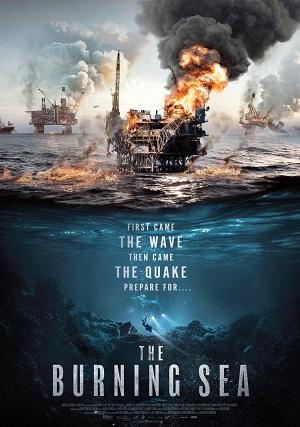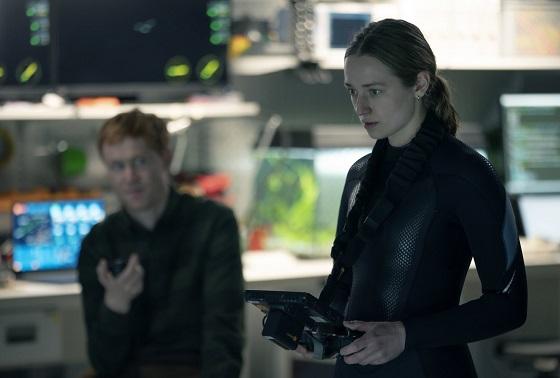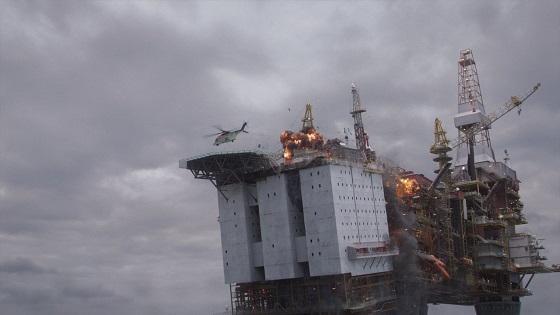

[Rating: Minor Rock Fist Up]
In theaters, on demand and digital February 25.
Unless you’ve been paying attention, you might have missed out on the fact that Norway is pretty much running the disaster-epic movie game these days. Forget your Moonfalls: it’s true! 2015’s The Wave just missed out on an Oscar nomination, and its sequel, The Quake, somehow managed to raise the stakes on an apocalyptic tidal wave concept. Luckily for fans of Scandinavian doomsday flicks, most of the creative team behind that series is back with The Burning Sea, which matches the scope and vibe of its predecessors (while not quite clearing the same bar on narrative cohesion).
A mockumentary soft open tees up the broader landscape of this story, which focuses on offshore drilling in Europe’s North Sea. Oil executive William Lie (Bjørn Floberg) speaks to an off-camera interviewer about the reckless approach companies and the government took when exploiting this resource in the 1970s. This acts as an onramp to the primary narrative, which sees Lie coordinating a response to a sunken drilling platform off the Norwegian coast. An offshore rig just went ahead and slid off its pylons and into the ocean, so Lie’s company brings in a team of unmanned submarine experts to explore the wreckage for air-pockets and survivors.
Sofia (Kristine Kujath Thorp) pilots the submersible vehicle with her tech assistant, Arthur (Rolf Kristian Larsen), and what they discover during their robot’s dive stuns everyone. Decades of drilling has turned an oceanic area the size of Colorado into tectonic Swiss cheese, and at any minute, not only is a massive oil spill possible, but hundreds of platforms could suffer the same fate as the recently fallen one. This puts thousands of oil workers and an entire ecosystem at risk, and one of those offshore roughnecks just happens to be Sofia’s boyfriend, Stian (Henrik Bjelland), who is father to the cutest, most precocious saucer-eyed little boy this word has ever produced (protect little Odin (Nils Elias Olsen) at all costs, people!).

When shit inevitably hits the fan, it’s up to Sofia and Arthur to get Chekov’s submersible into the film’s back half, where gas leaks, oil spills, explosions, earthquakes, and rising water levels keep the leads (and the audience) short of breath for the last 45 minutes or so. And while exciting and superbly acted, The Burning Sea feels somewhat clipped and choppy at times: like a film that had to cut 10 minutes to make a specific runtime. It’s not always clear why or how Sofia and the others are doing what they’re doing, and while these things often work themselves out, a quick scene or line of dialogue would have patched the narrative leak in most cases.
How an unmanned exploration robot the size of a party sub can help a person trapped inside a sunken oil platform hundreds of feet underwater is never explained, and the relationship between Lie’s oil company, the government, and Sofia’s robotics lab remains fuzzy throughout. And all that’s leaving aside the particulars of the big finale, which won’t be ruined here, yet offer more questions than answers. And while the script should be credited for providing some nuance to Lie and his corporate overlords (they never do anything explicitly evil), the film’s inability to decide whether or not they are the bad guys splits the broader narrative’s focus.

Even so, it’s a hell of a lot of fun, looks great, and has a cast to beat the band. Thorp serves as the main mast for the larger ship and ably balances the dramatic needs of the story against the physical ones. Sofia is the engine for the story, and if the audience doesn’t believe that she’s a brilliant scientist that also has balls big enough to fly out to sea during a once-in-a-century natural disaster, none of this works. Luckily for director John Andreas Anderson (who also helmed The Quake), he had a ringer in Thorp, and magnificent pieces around her to sell all of this.
Harald Rodenløw-Eeg co-wrote The Burning Sea, just as he did The Wave and The Quake, making him the genre’s unofficial Norwegian rabbi. It’s comforting to think of him sitting behind a keyboard, hammering out a series of increasingly dire Scandinavian apocalypse scripts to keep mining this thematic well, as each has been fun, dynamic, and unique. Like Godzilla movies, or entries in a Slasher genre, some will be better than others, yet each has its own particular charm. The Burning Sea is a solid entry: interesting, fun, though not always narratively tight. With any luck, the next one (Rodenløw-Eeg is running out of natural disasters, so I’m betting on volcano) will be just as fun and maybe even a little better.
If not, if it just treads water like a displaced oil rig worker stuck underneath a sinking platform, that’s fine too. Watching shit blow up while the world falls apart is fun, and when people are talking/screaming about it in Norwegian, it sounds halfway sophisticated and classy. These days, a movie lover should take their wins wherever they can get them.





Comments on this entry are closed.